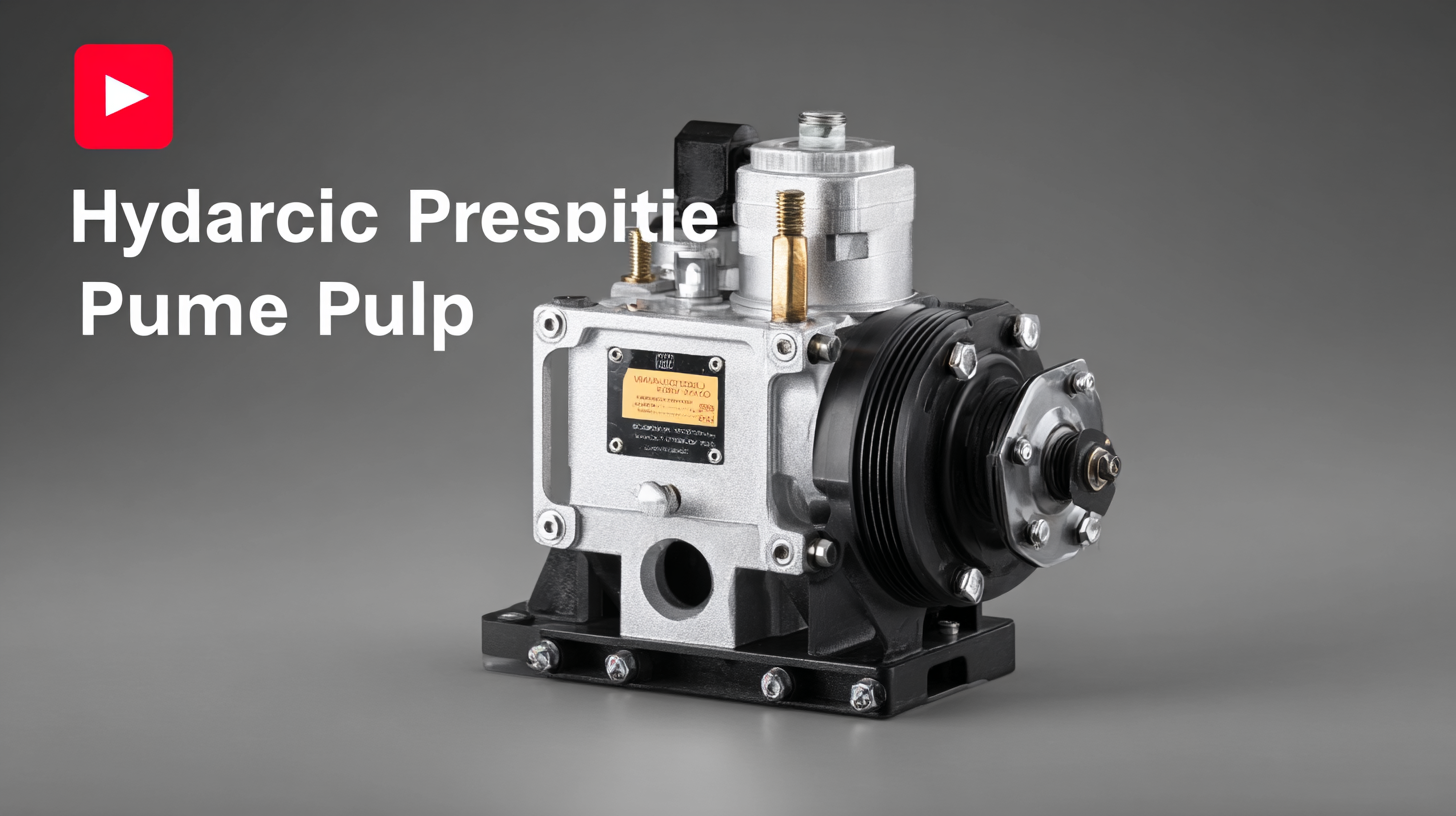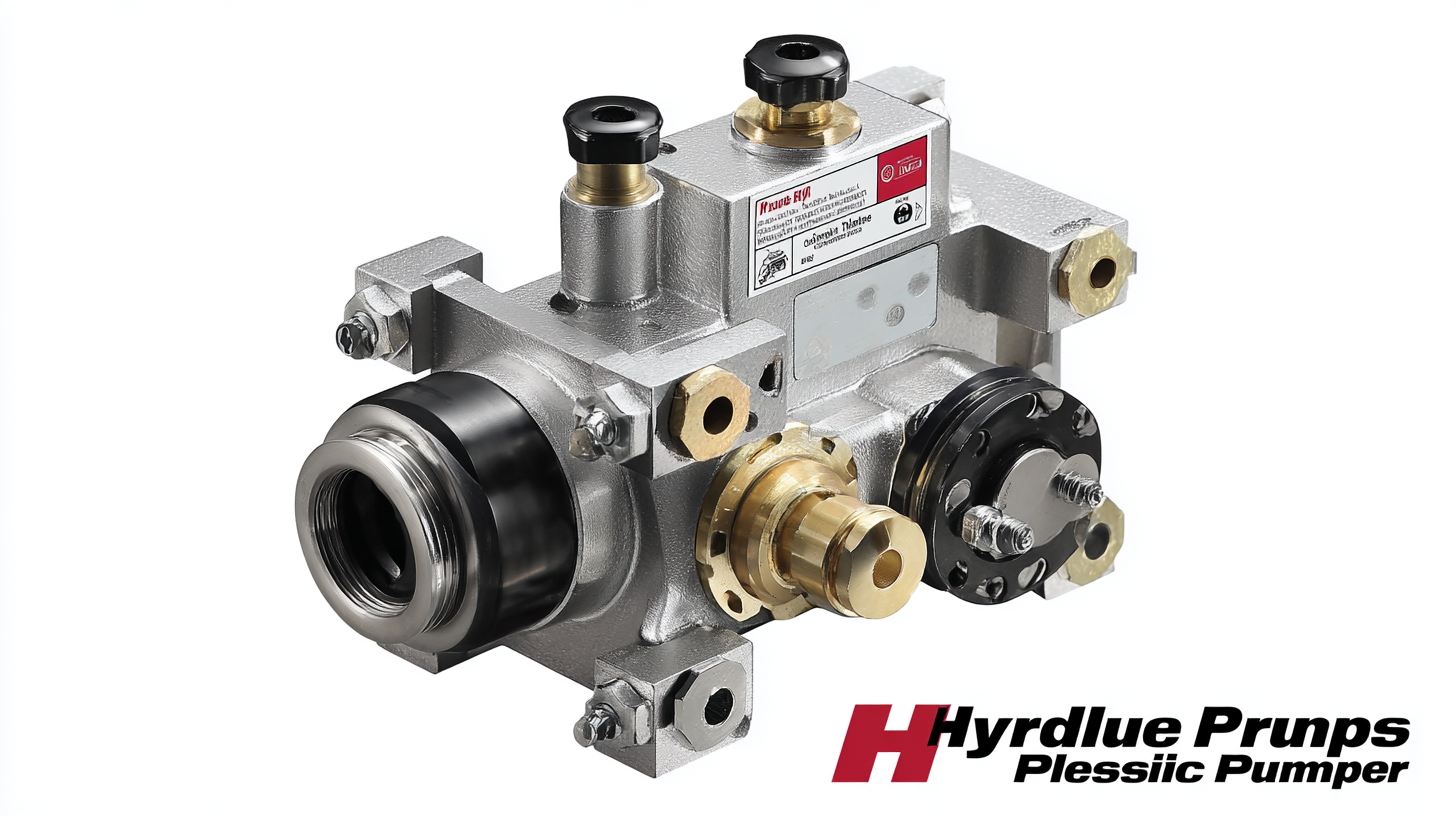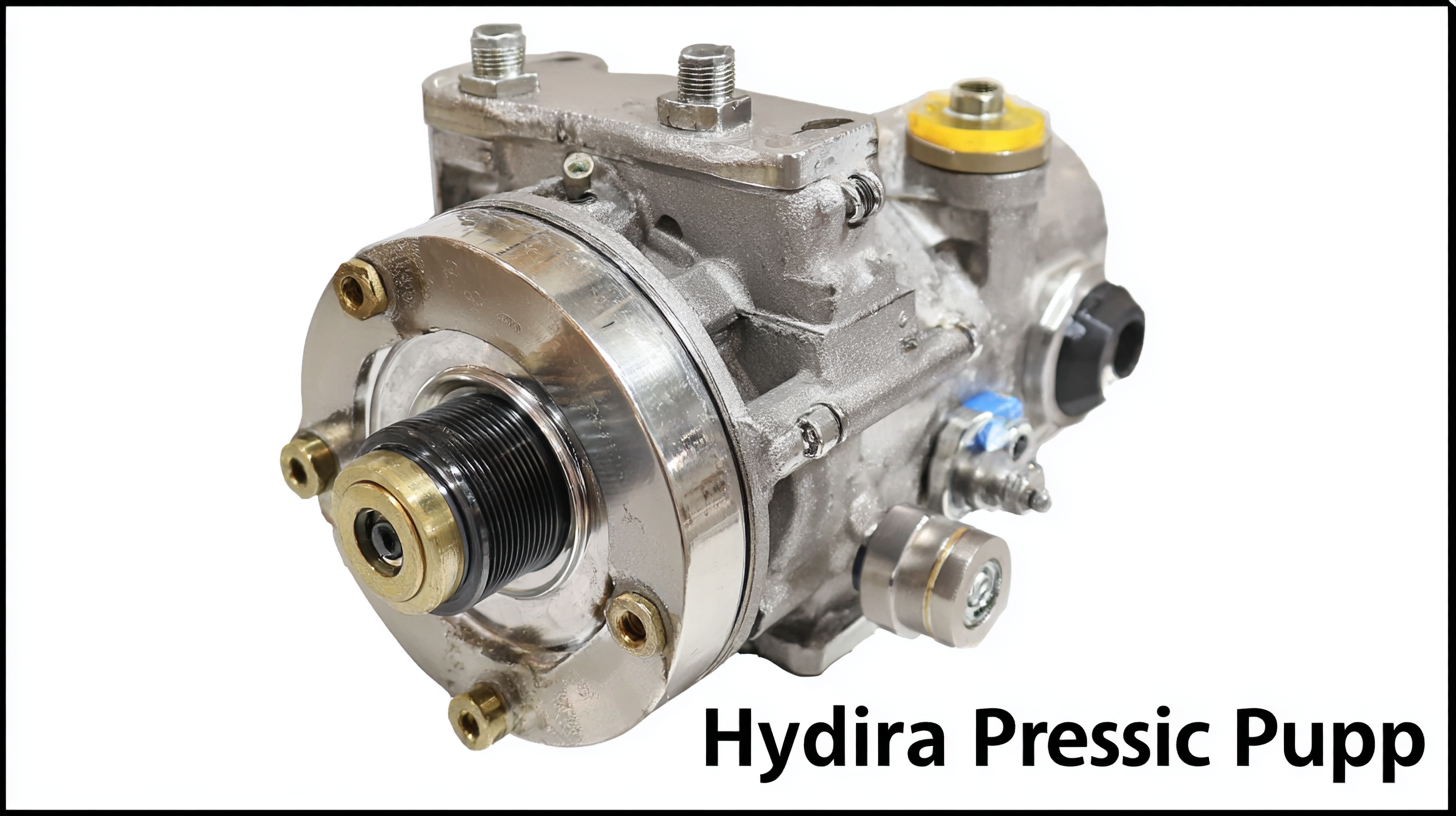Exploring the Top 5 Best Hydraulic Pressure Pump Models for Industrial Applications
In the modern industrial landscape, the demand for reliable and efficient hydraulic pressure pumps has surged, driven by advancements in automation and the growing need for precision in manufacturing processes. According to a recent market report by Mordor Intelligence, the hydraulic pump market is expected to grow at a compound annual growth rate (CAGR) of over 5.6% from 2021 to 2026, highlighting the importance of these systems in industrial applications.
Hydraulic pressure pumps play a critical role in a variety of sectors, including construction, agriculture, and manufacturing, providing the necessary force to power machinery and tools. With many models available, it is crucial to identify the best hydraulic pressure pump that meets both performance and efficiency standards. This blog aims to explore the top five hydraulic pressure pump models that stand out in quality and reliability, encapsulating the essence of "global leading manufacturing, China quality output."
Key Features to Consider When Selecting Hydraulic Pressure Pumps
When selecting a hydraulic pressure pump for industrial applications, certain key features must be taken into account to ensure optimal performance and efficiency. One of the most critical factors is the pump's capacity, typically measured in horsepower (HP) or kilowatts (kW). According to a recent industry report by MarketsandMarkets, the hydraulic pump market is expected to reach $33.8 billion by 2025, with a compound annual growth rate (CAGR) of 5.5%. This growth underscores the importance of choosing pumps that balance power output with energy consumption, as this affects both operational costs and sustainability efforts.
Another significant feature is the pump's pressure rating, which indicates how much pressure the system can handle. Most industrial applications require pumps with pressure ratings ranging from 1,000 to 5,000 psi. It's essential to select a model that can handle the specific demands of the application without compromising safety or performance. Additionally, users should consider the pump's maintenance requirements, as regular maintenance can prolong pump life and ensure uninterrupted operation. A report from Technavio highlights that efficient maintenance strategies can reduce downtime by up to 20%, emphasizing the need for durable and reliable pumps in industrial settings.
The Advantages of Using Hydraulic Pressure Pumps in Industrial Settings
Hydraulic pressure pumps play a critical role in the efficiency and productivity of industrial applications. One of the primary advantages of using these pumps is their ability to provide a highly controlled and reliable force, essential for various operations such as material handling, metal forming, and assembly. According to a recent report by Grand View Research, the hydraulic pumps market is expected to grow at a compound annual growth rate (CAGR) of 5.8% from 2021 to 2028, underscoring the increasing reliance on hydraulic systems in industrial settings. This growth reflects the demand for high-performance, durable pumps capable of meeting rigorous operational demands.
Moreover, hydraulic pressure pumps are favored for their superior energy efficiency compared to electric motors and other systems. The U.S. Department of Energy has indicated that hydraulic systems can achieve up to 90% efficiency in energy conversion, which is significantly higher than conventional systems. This efficiency not only translates to lower operational costs but also reduces the overall carbon footprint of industrial operations, making hydraulic pumps an environmentally friendly choice. By utilizing these powerful pumps, industries can optimize their processes while adhering to sustainability goals.
Comparative Analysis of the Top 5 Hydraulic Pressure Pump Models
In the realm of industrial applications, the comparative analysis of hydraulic pressure pumps is essential for selecting the most effective model for specific needs. As the hydraulics market continues its projected growth, with an estimated worth of $44.26 billion by 2030, industries are increasingly relying on advanced technologies to enhance performance and efficiency. This evolution emphasizes the importance of understanding the strengths and weaknesses of different pump models.
Recent studies have shown significant advancements in hydraulic system performance metrics through innovative techniques like machine learning and computational fluid dynamics (CFD). For instance, comparative analyses of various hydraulic models reveal the successful reduction of flow and pressure ripples, which can severely impact operational efficiency. The integration of technologies such as K-means clustering for fault diagnosis further underscores the move towards more intelligent, responsive hydraulic systems, making it critical for industries to stay updated on the top-performing models in the market.
Exploring the Top 5 Best Hydraulic Pressure Pump Models for Industrial Applications - Comparative Analysis of the Top 5 Hydraulic Pressure Pump Models
| Model |
Max Pressure (psi) |
Flow Rate (GPM) |
Power Source |
Weight (lbs) |
Price ($) |
| Model A |
3000 |
2.5 |
Electric |
50 |
450 |
| Model B |
4000 |
3.0 |
Hydraulic |
75 |
600 |
| Model C |
3500 |
2.0 |
Petrol |
65 |
500 |
| Model D |
4500 |
4.0 |
Electric |
80 |
750 |
| Model E |
3700 |
2.7 |
Hydraulic |
70 |
520 |
Maintenance Tips for Ensuring Optimal Performance of Hydraulic Pumps
Maintaining optimal performance in hydraulic pumps is essential for ensuring efficiency and longevity in industrial applications.
According to a report by the Hydraulic Institute, regular maintenance can reduce the total cost of ownership by up to 30%.
Key maintenance tasks include regular inspection of hydraulic fluid levels, filtration systems, and seals.
Contaminated hydraulic fluid can lead to pump failure and decreased efficiency, making it crucial to change filters frequently and replace fluids as recommended based on the pump's operating conditions.

Additionally, monitoring the operating temperature is vital.
The American Society of Mechanical Engineers (ASME) suggests that hydraulic systems operate best within a temperature range of 140°F to 180°F.
Exceeding this range can lead to fluid degradation, thereby affecting the pump's performance.
Users should ensure that cooling systems are functioning effectively, particularly in high-demand scenarios.
Implementing a preventive maintenance schedule not only helps in identifying potential issues before they escalate but also contributes to a significant increase in the hydraulic pump's lifespan, enhancing overall productivity in industrial facilities.
Real-World Applications Showcasing the Effectiveness of Hydraulic Pressure Pumps
 Hydraulic pressure pumps play a pivotal role in various industrial applications, delivering high efficiency and reliability. In environments ranging from manufacturing to construction, these pumps are essential for powering hydraulic machinery, enabling effective material handling, and executing precise operations. According to a recent market report by Research and Markets, the hydraulic pump market is projected to exceed $12 billion by 2026, driven by the increased adoption of hydraulic equipment in industrial processes. Real-world applications, such as hydraulic excavators and mobile cranes, showcase the effectiveness of these pumps in improving productivity and reducing operational downtime.
Hydraulic pressure pumps play a pivotal role in various industrial applications, delivering high efficiency and reliability. In environments ranging from manufacturing to construction, these pumps are essential for powering hydraulic machinery, enabling effective material handling, and executing precise operations. According to a recent market report by Research and Markets, the hydraulic pump market is projected to exceed $12 billion by 2026, driven by the increased adoption of hydraulic equipment in industrial processes. Real-world applications, such as hydraulic excavators and mobile cranes, showcase the effectiveness of these pumps in improving productivity and reducing operational downtime.
When selecting a hydraulic pressure pump, it is crucial to consider compatibility with the intended application. For instance, high-pressure pumps work best for heavy-duty tasks, while lower pressure options may suffice for lighter operations. Tip: Always consult technical specifications to ensure the pump can handle the necessary flow rates and pressure levels required for your equipment.
Moreover, regular maintenance of hydraulic pressure pumps can significantly enhance their longevity and performance. Keeping an eye on fluid levels and cleanliness will prevent common issues like cavitation and overheating. Tip: Implement a routine inspection schedule and use high-quality hydraulic fluids to ensure optimal pump operation. This proactive approach can lead to greater efficiency and reduced costs over time.



